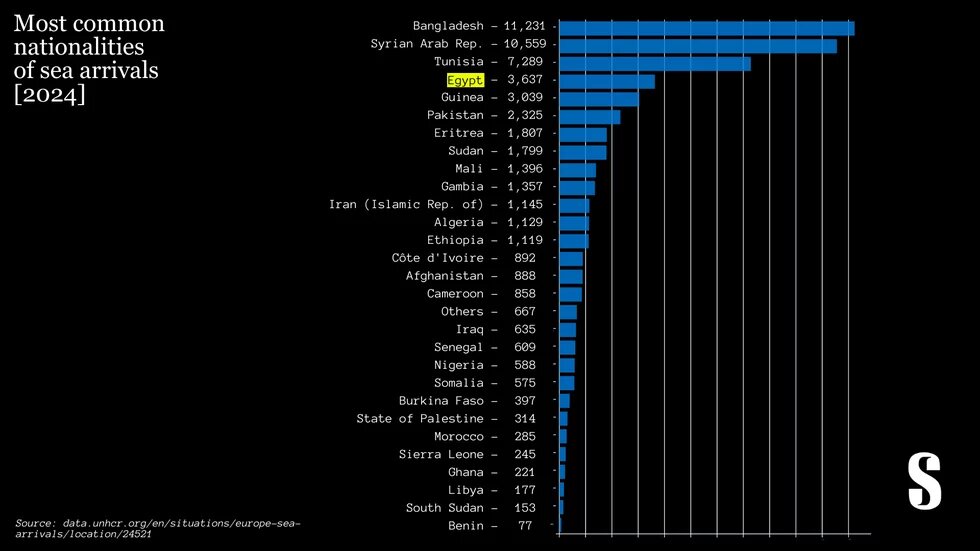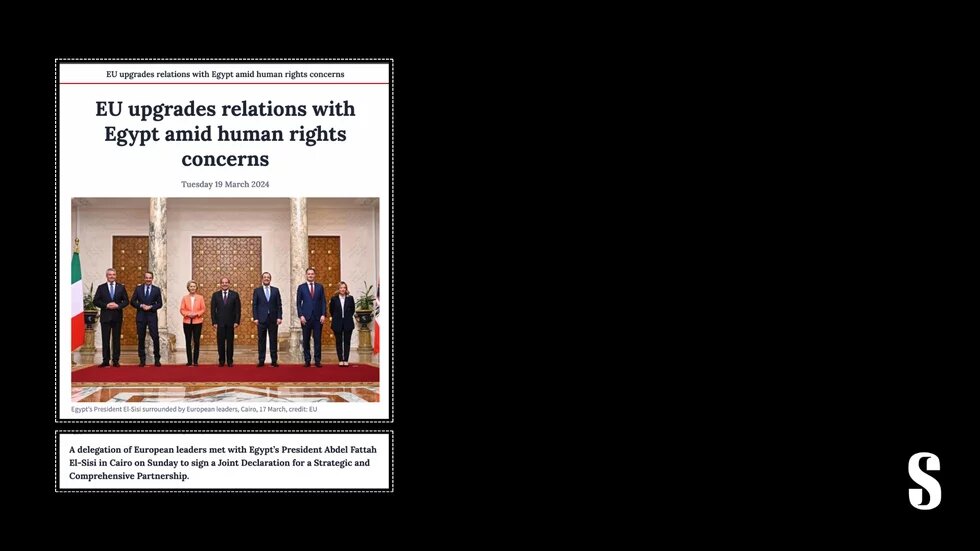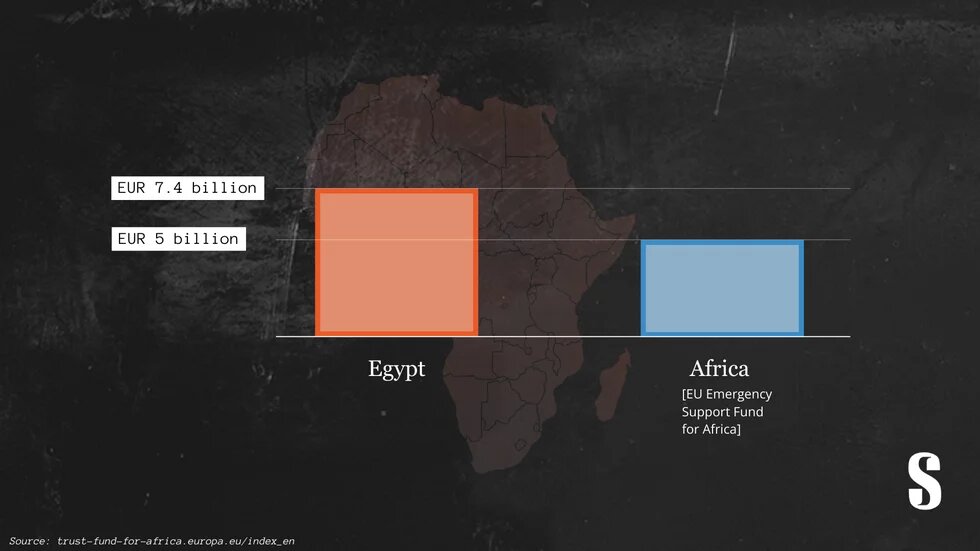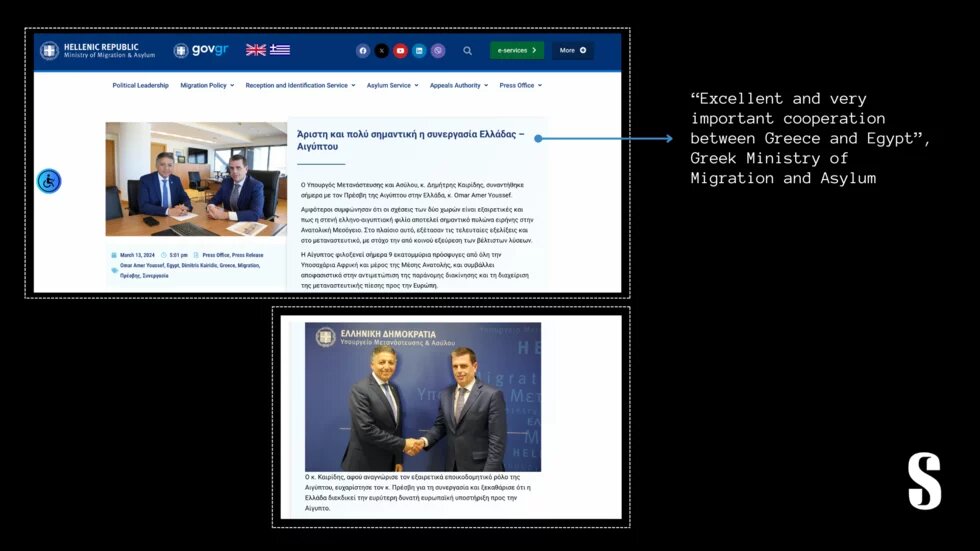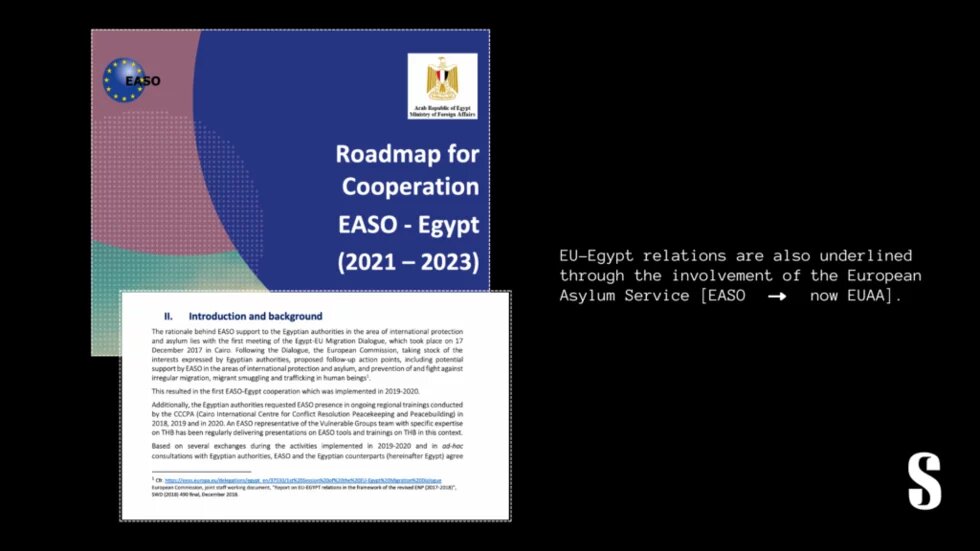
From 2024 to 2027, Egypt is slated to receive more EU aid than any other country, under a migration agreement which aims to prevent the arrival of refugees and migrants into the European Union.
Authors: Christian Jakob, Stavros Malichudis
Illustration: Galatia Iatraki
Translation: Gigi Papoulias
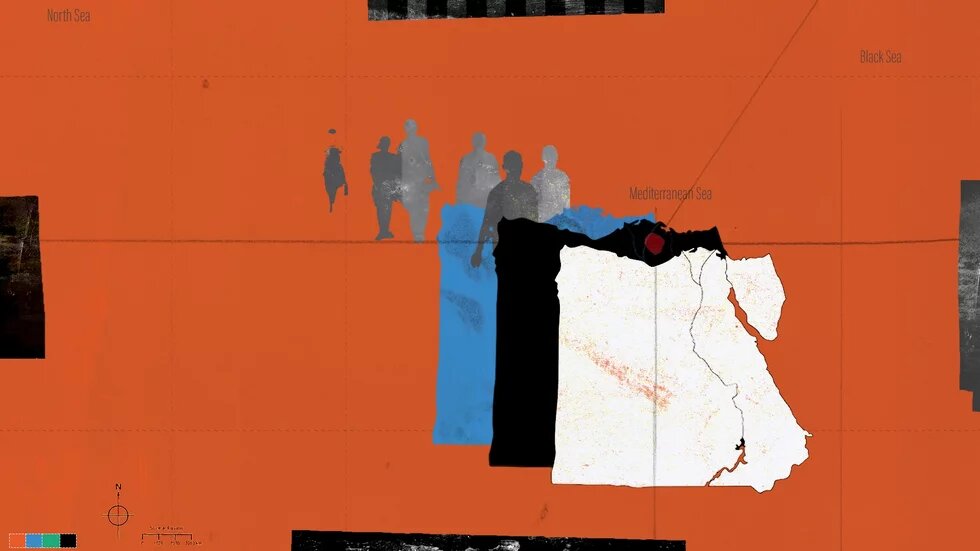
Contents: Agreements with Germany, Italy ∗ The first Egypt-Germany agreement ∗ The introduction of CEAS ∗ The March 2024 Agreement ∗ The first billion euros ∗ The EU – Egypt Investment Conference ∗ Ylva Johansson’s visit ∗ The “Common Platform for Migrants and Refugees” ∗ Inflation at historic highs ∗ The €200 million grants for migration ∗ “The EU has never granted a similar aid package before”
When the Egyptian general Abdel Fattah El-Sisi visited Berlin in November 2018, during the final press conference, German Chancellor Angela Merkel stood alongside a leader who has a tremendous record of human rights violations.
The Chancellor stated that in the coming years, with El-Sisi assuming the presidency of the African Union, Egypt could “play an even more important role in the area of migration.”
She added, “We have discussed that Egypt is doing an excellent job in guarding its maritime borders, so that starting from Egypt, migration to Europe is being stopped, even though there are a large number of refugees living in Egypt. This is something that deserves recognition.”
Thus, “all of Egypt’s efforts at economic reforms will be supported,” the Chancellor stated, and hastened to add that “another financial loan of about €500 million” will be made available to Egypt.
Agreements with Germany, Italy
The Egyptian leader received the aid for keeping refugees out of Europe. These efforts can be traced back to 2004, with the Euro-Mediterranean Association Agreements, which the European Union concluded, at the time, with a total of seven Mediterranean countries.
Even then, the agreement concerned cooperation in the prevention and control of irregular migration. Among other things, the readmission of deported citizens had been agreed upon: Egyptians rarely receive asylum in the European Union. Italy paved the way with a bilateral agreement in 2007, while during a previous meeting between Merkel and El-Sisi in Cairo in 2017, the two leaders had discussed the deportation of about 1,000 Egyptians from Germany.
European countries are providing Egypt with training and equipment to keep its borders closed. Most of the agreements already signed are bilateral: the UK and France cooperate with Egypt mainly on military issues, Germany and Italy on police force issues. The Italian company IVECO, a manufacturer of vehicles and trucks, has equipped the Egyptian police with vans.
When Italy and Egypt signed the deportation agreement in 2007, Italy gave two patrol vessels to the Egyptian coast guard.
Germany’s support to Egypt for regulating migration began after another meeting between El-Sisi and Merkel in Berlin in June 2015. While in April 2016, during his visit to Cairo, the Federal Finance Minister (at the time) Sigmar Gabriel not only mentioned the planned sale of two submarines, but also generously declared that he was “ready to help” the country manage its borders with Libya.
The first Egypt – Germany agreement
The arrival of over one million refugees in central Europe between August 2015 and spring 2016 triggered an unprecedented diplomatic effort to stem migration by utilizing intermediary countries.
Attention quickly turned to Egypt. In July 2016, the German and Egyptian governments signed an agreement on security cooperation, which included a commitment to combat illegal migration. In August 2017, the governments agreed to a bilateral dialog on migration which provided for:
- the fight against irregular migration and smugglers
- greater efforts to prevent illegal arrivals on Egyptian shores
- prevention of irregular transit migration, particularly through the land border with Libya
- return of refugees found in Egypt, without a residence permit, to their countries of origin
- care for persons in need of international protection under Egyptian law
- readmission of Egyptians living illegally in Germany.
A report by Frontex (European Border and Coast Guard Agency) on Africa, issued in 2016, had recorded increasing numbers of arrivals of Sudanese refugees in the Mediterranean via Egypt.
In September 2016, during a meeting on European refugee policy in Vienna, Angela Merkel stated that “agreements similar to the one we have today with Turkey must first and foremost be concluded with Egypt, but also with other African countries.”
Since that year, a “migration dialog” as it is called, has been held at the highest level of the EU, for “closer strategic cooperation on migration”. At the same time, the European Union Agency for Asylum (EUAA, formerly EASO) is providing support to the Egyptian authorities in developing their national asylum system.
The introduction of CEAS
In December 2023, the EU adopted the new Common European Asylum System (CEAS), and later stated in an explanatory memo that CEAS includes a “new model based on comprehensive cooperation with transit countries, one of which is Egypt.”
Thus, migration could be “embedded in a framework of close cooperation (...) together with other issues such as the economy and trade, investment in green growth, security and people-to-people relations.” The EU spoke of a comprehensive approach that would cover many aspects, from addressing the root causes of irregular migration to cooperation on aspects such as border management. In 2024, Egyptian citizens were the fourth largest group arriving irregularly in the central Mediterranean and the third largest in the eastern Mediterranean. In contrast to the past, an increasing number of boats leaving Egypt are also recorded.
According to data from the UN High Commissioner for Refugees, at the end of 2024, Egyptians represented 7% of the total 11,990 residents in the closed reception centers on the Aegean islands, constituting the third largest nationality after Syrians (38%) and Afghans (36%).
A recent report by Solomon concludes that due to increased controls and monitoring in Egypt, Egyptians who wish to reach Europe usually head to neighboring Libya. There, they often remain trapped in warehouses for several weeks, as the trafficking rings demand additional money from their families.
The March 2024 Agreement
On March 17, 2024, the President of the European Commission, Ursula von der Leyen traveled to Cairo accompanied by six European heads of state. Among them were Greek Prime Minister Kyriakos Mitsotakis, Belgian Prime Minister Alexander De Croo, Italian Prime Minister Giorgia Meloni and Austrian Chancellor Karl Nehammer.
“Egypt is and will be an important country for Europe,” a Commission spokesman said at the start of the visit, referring to a “difficult neighborhood bordering Libya, Sudan and the Gaza Strip.” Von der Leyen and El-Sisi signed a Memorandum of Understanding (MOU), entitled “Joint Declaration on the Strategic and Comprehensive Partnership between Egypt and the EU”.
Migration undoubtedly plays a central role in this cooperation, and the document mentions migration as one of the specific areas of cooperation. The relevant passage notes, among other things, that the goal is a “holistic approach to migration governance.” The aid is intended for “migration-related programs,” “legal migration pathways,” and “mobility schemes.”
Reference is also made to “the root causes of irregular migration, combating smuggling of migrants and trafficking in persons, strengthening border management, and ensuring dignified and sustainable return and reintegration.” In addition, the declaration states that there should be further support for “Egypt’s efforts to host refugees”.
The European Union has signed similar MOUs with other countries. The difference, in the case of the agreement with Egypt, is the exorbitant amount allocated: €7.4 billion. To put that in perspective, in the past five years the EU has provided €5 billion to the EU Emergency Trust Fund for Africa (EUTF), which serves similar purposes.
From 2024 to 2027, Egypt will receive more money than any other country in the past, under a migration agreement with the EU. The aid includes:
- loans with favorable terms of €5 billion
- €1.8 billion of additional investments, under the “Southern Neighborhood Economic and Investment Plan”
- €600 million in additional grants, of which €200 million is earmarked for migration management.
In all likelihood, a key factor in this generosity was the EU’s fear of a large number of displaced Sudanese heading towards Europe via Egypt.
Greece, in particular, has recently seen an increase in arrivals of migrants of Egyptian origin via a new refugee route from the Libyan city of Tobruk to Crete. After the signing of the agreement, Von der Leyen spoke of a “historic milestone” in relations between the EU and Egypt.
The first billion euros
On April 12, 2024, EU member states cleared the way for one billion euros in financial assistance to Egypt under the March Agreement.
The finance ministers authorized the Commission to borrow the necessary funds and transfer them to Egypt as loans in a single tranche.
The disbursement of the funds is conditional on “Egypt continuing to make concrete and credible progress in respecting effective democratic mechanisms (...) and the rule of law and guaranteeing respect for human rights.”
In addition, Egypt will have to fulfill economic and fiscal conditions and make progress on structural reforms. After the first loan of one billion euros, loans of four billion euros will follow between 2024-2027.
The EU – Egypt Investment Conference
On June 29-30, 2024, the European Union and the government of Egypt co-hosted the EU – Egypt Investment Conference at the Al Manara International Conference Center, Cairo’s “most glamorous conference center”. The conference aimed to boost private sector investment in Egypt. On the occasion, Commission President Ursula von der Leyen and El-Sisi signed an MOU, which provides for the provision of macro-financial assistance of up to €1 billion. This is the first tranche of the Agreement that was signed in March.
In the presence of more than 1,000 business representatives, Von der Leyen stated in her speech that the EU is committed to “more financial assistance, more investment in strategic sectors and more skills for Egyptian workers.”
She added that the aid package “will incentivize Egypt’s reform agenda” and “will foster a stronger business environment.” In addition, she stated that the EU had committed “to step up our strategic investments in Egypt” and that the additional €1.8 billion in EU investment can be channeled into “strategic sectors” such as clean electricity and hydrogen. As a result, she announced the signing of a new project, a €25 million program in funding to provide training in clean technology and digital training to young Egyptians.
Ylva Johansson’s visit
In September 2024, European Commissioner for Home Affairs Ylva Johansson visited Egypt and “welcomed Egypt’s successful efforts in preventing the departure of vessels carrying irregular migrants from Egypt through the Mediterranean.”
During the visit, both sides underlined the “importance of cooperation to enhance border management and combating criminal networks involved in trafficking human beings...”.
Further cooperation between Egypt and European Union Home Affairs agencies, such as the EU Agency for Asylum (EUAA), European Border and Coast Guard Agency (Frontex), European Union Agency for Law Enforcement Cooperation (Europol), European Union Agency for Law Enforcement Training (CEPOL) and the EU Drugs Agency (EUDA), was announced.
The “Common Platform for Migrants and Refugees”
On October 2, 2024, Ambassador Christian Berger, Head of the EU Delegation to Egypt, launched the Joint Platform on Migrants and Refugees.
The joint United Nations program implemented by UNHCR, the International Organization for Migration, UNICEF and the World Health Organization aims to support Egypt’s commitment within the framework of the United Nations Network on Migration as one of the “25 Champion Countries of the Global Compact for Safe, Orderly and Regular Migration” as well as Egypt’s commitment to the Global Compact for Migration.
The EU contributed €12.2 million to this innovative initiative. “Despite increasing needs following the influx from Sudan since April 2023, Egypt continues its efforts to provide essential services,” the UN said.
The platform will “ensure that essential protection services remain available to the most vulnerable” and “will benefit host communities in selected areas.”
Inflation at historic highs
By the end of 2024, no aid had been disbursed from the Joint Agreement. However, Egypt desperately needs the money.
Inflation in Egypt has skyrocketed to 33.5% and seeking aid from the international financial market has become extremely costly for the government. The yield on Egyptian treasury bills has neared 31%, while in early December the Central Bank of Egypt announced that it would issue government bonds worth 84 billion Egyptian pounds ($1.8 billion).
The €200 million grants for migration
The Joint Agreement mentions “€600 million in additional grants, including €200 million for migration management.” The €200 million migration aid package is earmarked for specific programs and will be disbursed following calls for proposals by the Commission.
However, in September 2024 the European Court of Auditors published an assessment of the Emergency Trust Fund for Africa , expressing concerns about “potential human rights risks linked to several Trust Fund activities in Libya.”
Similar concerns were raised by the EU Ombudsman for Human Rights, Emily O’Reilly regarding the EU’s migration programs in Tunisia. Both led to growing doubts about how the new program in Egypt could ensure the respect for human rights.
This is likely to delay the start of border protection and management programs funded with the €200 million from the 2024 Joint Agreement.
Egyptian civil society organizations have called for the inclusion of “clear benchmarks for reforms in the upcoming Agreement, in order to promote the rule of law, accountability and stability.”
Otherwise, EU financial support would risk “bringing about the same unsustainable policies of the Egyptian government that have undermined political and economic rights.”
“The EU has never granted a similar aid package before”
MEP Tineke Strik (Netherlands – GroenLinks green party) has been involved in migration for many years, and has been the European Parliament’s rapporteur on Egypt since 2024. After visiting Egypt in December 2024, Strik told Solomon that “it is clear that the country is in a very precarious situation.”
The economy has suffered “many blows” including the reduction of traffic in the Suez Canal due to the situation in the Middle East. “At the same time, the country is of enormous strategic importance for the EU,” noted Strik. Due to its geography, “it is surrounded by great instability”, therefore “it is very important to see how Egypt can be supported financially.”
The Joint Agreement includes a large sum of money and “the EU has never before given a similar amount to any country except Ukraine. It is unprecedented. But we believe there are reasons to do it.”
The EU, however, must ensure that this money is spent “in accordance with our principle for external actions” and subject to “good governance and human rights.” In Egypt, Strik stated, the human rights situation is as “worrying” as the rule of law.
“Therefore, it is really important that it is understood by both sides that we will not only intensify our economic cooperation, but also improve some deficiencies in the rule of law.” Strik recalled that Egypt had promised the UN Human Rights Council that the situation would improve.
“The EU should seize the opportunity offered to it to ensure that the people of Egypt benefit from this support on issues concerning their freedom and fundamental rights.”
* This report was first published on 10-1-2025 on the Solomon website and was carried out with financial support by the Heinrich Böll Foundation – Thessaloniki office. The content of this article is the sole responsibility of the authors and does not necessarily represent the views of the Foundation.
